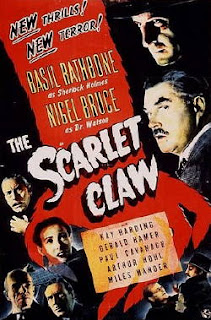Dramatic licence - good or bad?
Here's a question. What do you all think about dramatic licence? Are you in the camp (as I used to be) who demand complete and total fidelity and adherence to the source novel, are you at the other extreme where you think anything goes or are you somewhere in between?
I, as stated, used to demand a rigid adherence to the source material and so was frequently annoyed, to some degree or other, by most Holmes dramatisations. Now I realise that this looks odd to anyone who knows me and also knows that the film that first got me interested in Holmes back in 1982 was Basil Rathbone's The Scarlet Claw. Anyone who has seen it will know how un-canonical it is.
Over time I have drifted from this strict position (but not too far). I still think that outrageous dramatic licence (which is more about a director/screenwriter's ego) should be discouraged but intelligent changes designed to suit the medium should be encouraged.
Please comment and let me know which adaptations of Holmes stories have pleased/irritated you the most
I, as stated, used to demand a rigid adherence to the source material and so was frequently annoyed, to some degree or other, by most Holmes dramatisations. Now I realise that this looks odd to anyone who knows me and also knows that the film that first got me interested in Holmes back in 1982 was Basil Rathbone's The Scarlet Claw. Anyone who has seen it will know how un-canonical it is.
Over time I have drifted from this strict position (but not too far). I still think that outrageous dramatic licence (which is more about a director/screenwriter's ego) should be discouraged but intelligent changes designed to suit the medium should be encouraged.
Please comment and let me know which adaptations of Holmes stories have pleased/irritated you the most



I used to be incredibly strict about adaptations of anything staying true to canon, but now I realise that with something like Holmes, everyone has a different interpretation of him, and given the lack of continuity in Doyle's stories and the mystery that surrounds Holmes all through the canon, anything can go - if it has grounding in the original.
ReplyDeleteLaurie R. King's Mary Russell stories went downhill after the first book because of the ridiculous development that had Holmes marry Russell, which goes completely against one of the main facets of Holmes' character. However, The Seven Per-Cent Solution by Nicholas Meyer, works incredibly well because it remains true to the characters, and doesn't deviate from canon so much as expand upon points that were already introduced.
Similarly, the recent Guy Ritchie film stayed consistent and only emphasized certain character traits, such as Holmes' messiness and bohemian nature, which are often overlooked in other adaptations.
The BBC series "Sherlock" was particularly interesting (and extremely brilliantly done) because the modern setting was completely different to the stories, but John and Sherlock's characters are the same as in the canon.